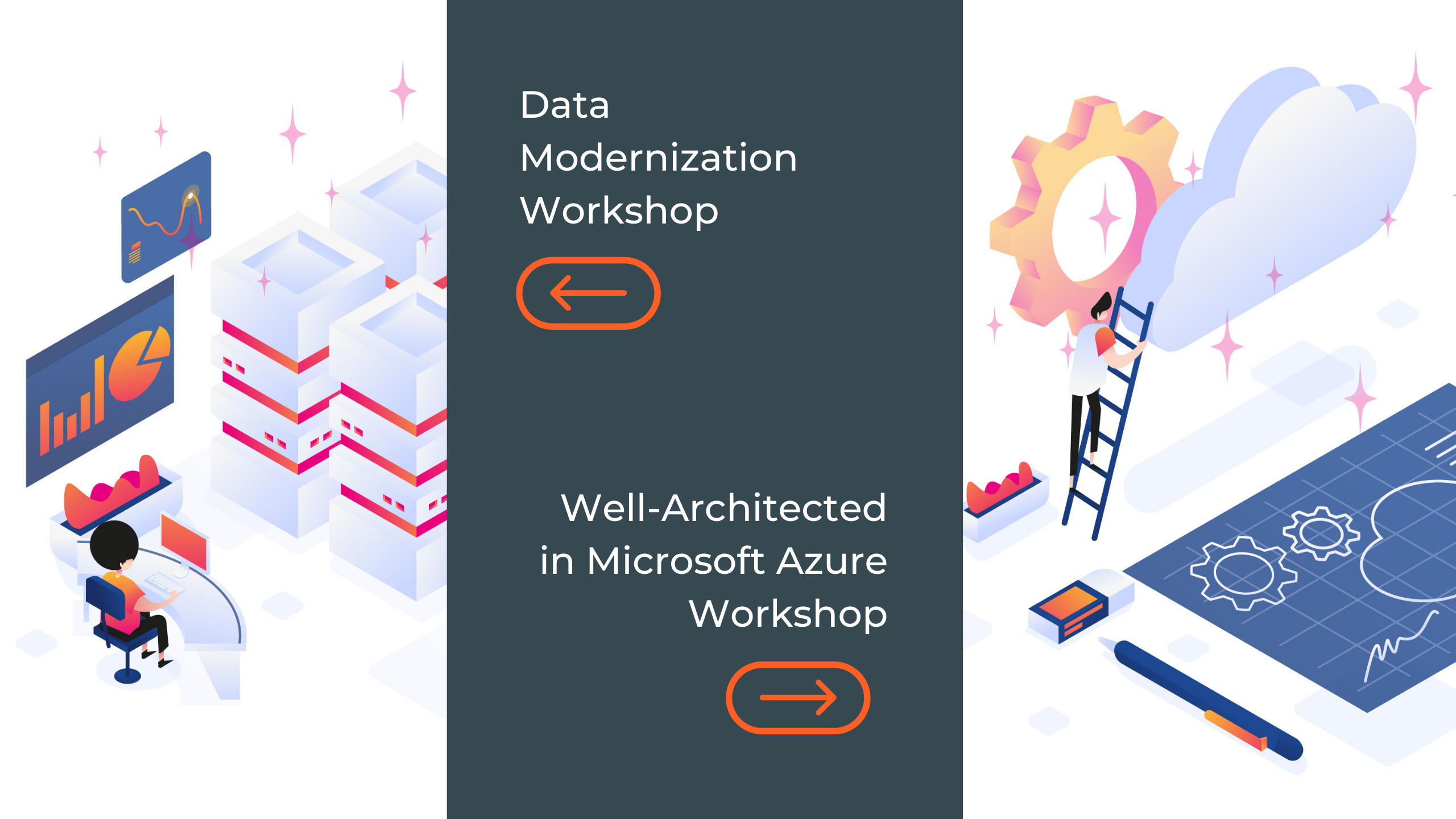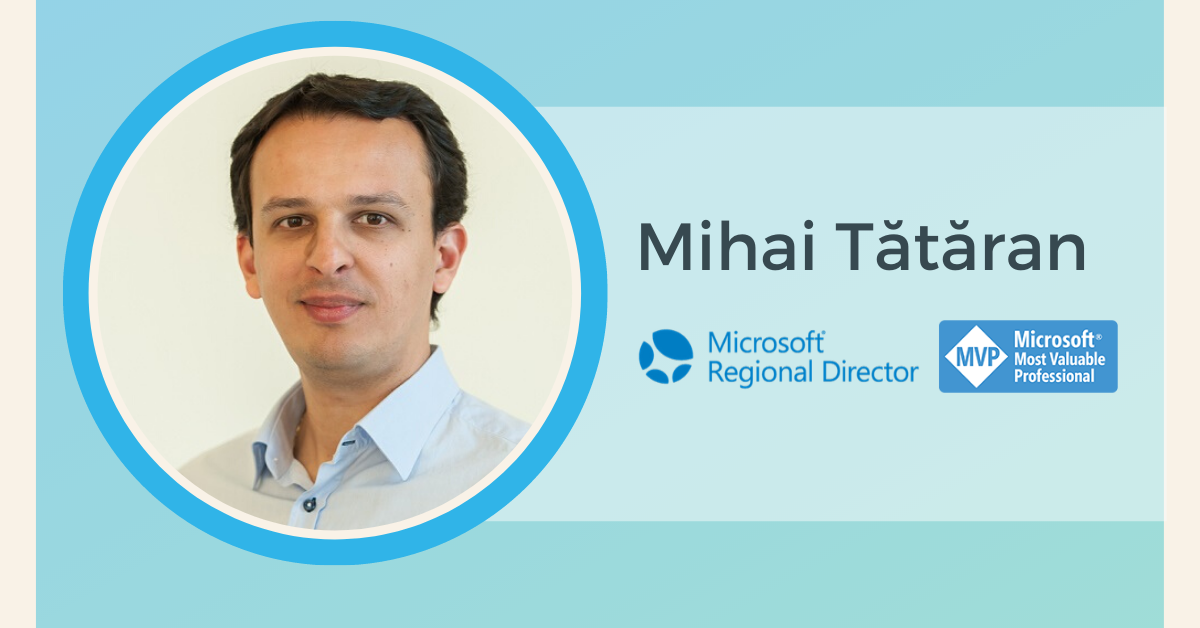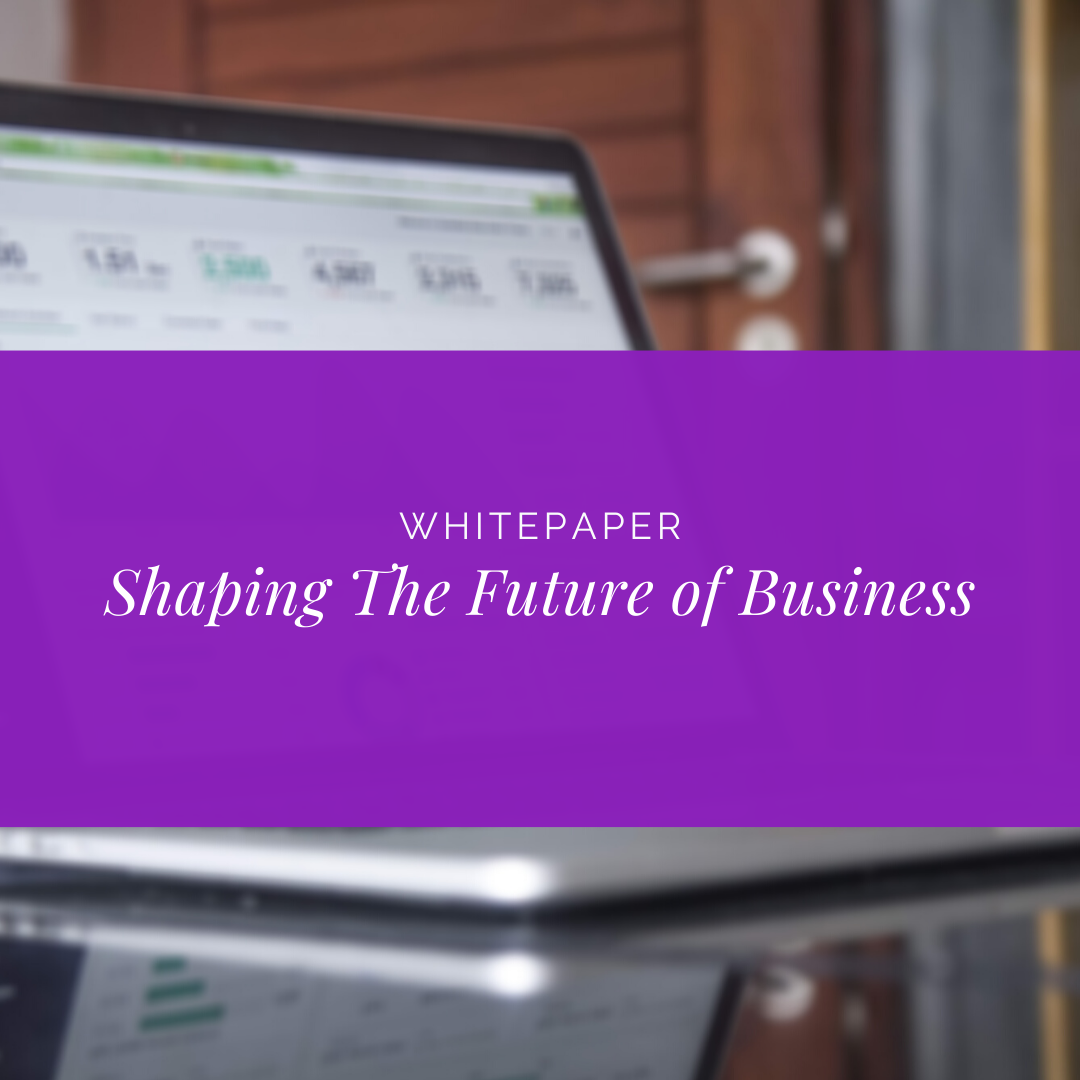
Mihai Tataran
General Manager & Partner | Azure MVP
First of all I should begin with what I do: I manage a 40+ IT consulting, training and software development company, and I work as a trainer and consultant for customers in Romania and abroad, mostly on the Cloud technology. This article is based on what we do here in Avaelgo.
To set the context, I believe the change of the IT consultant’s job is influenced by at least 3 factors:
- The IT world and it’s fast evolution
- People in IT
- The Customer
Today’s IT world is evolving very fast and is getting more complex. To quote Mr. Nadella (Microsoft CEO) „Our industry does not respect tradition – it only respects innovation.” We are living times with amazing developments in our industry, to name just a few: Cloud, Machine Learning, Artificial Intelligence, Virtual Reality and so on – all game changers, all paradigm shifters in the way we do business.
Another aspect is people: an estimate of Gartner says that by 2020 we will have 10 times more servers and 1.5 times more people in IT, which indicates that the current lack of qualified personnel will become deeper and more dramatic. While at a first glance this might seem as an insurmountable problem, actually this issue paves the way to innovation and automation at other levels, including the way we manage large software infrastructures.
And the third I mentioned: the Customer. Due to technological evolution (e.g. the internet) the Customer is much more informed about his needs than he/she was 10 years ago. A typical buyer journey has changed so dramatically, that by the time the Customer engages us as a potential supplier, they have already made up their mind in a percentage of more than 50%.
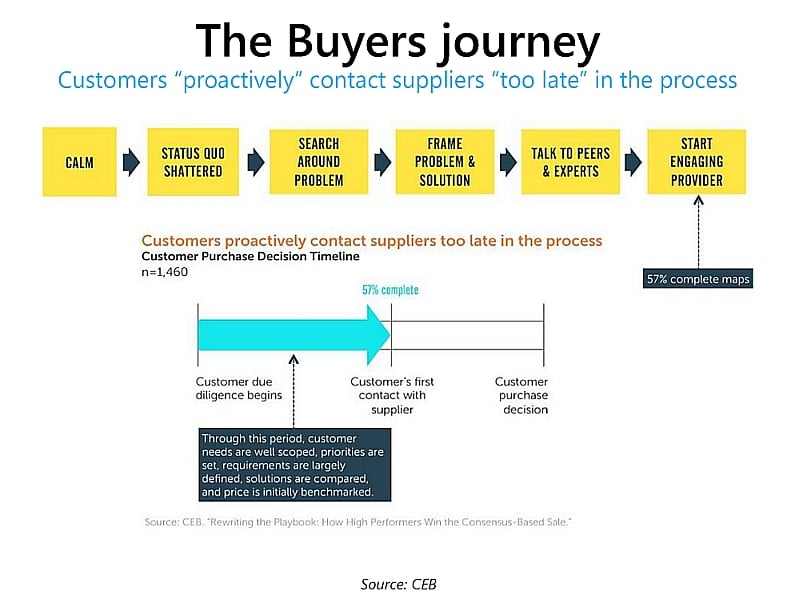
This means the salesman does not have the upper hand anymore, there is no information asymmetry, there is a much lesser chance to „influence” the Customer. This also brings a challenge: what if the Customer is poorly or wrongly informed?
The Journey of a Consultant
The consultant’s job is not a technical job only, it has never been, but the non-technical aspect is increasing more and more. What I propose here is to discuss in detail what a Consultant might do in the real world.
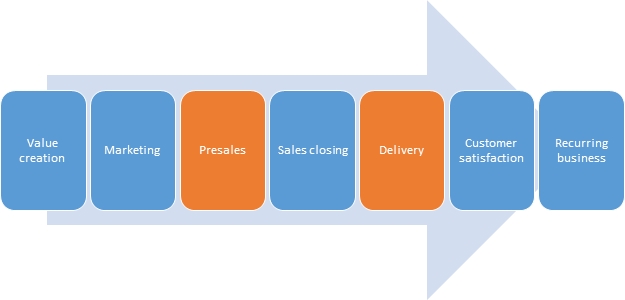
I marked with a different color what we typically believe is the job of a Consultant. Now I would like to explore the other aspects as well.
Value creation
All products and services start here. We sometimes assume what the Customer wants, but we need to better define how we will make it, how we will deliver it, and what will make us special so that the Customer will buy from us. One of the key elements in this stage would be to define the Differentiated Value Proposition. Here is a simple schema specifying how to do this:
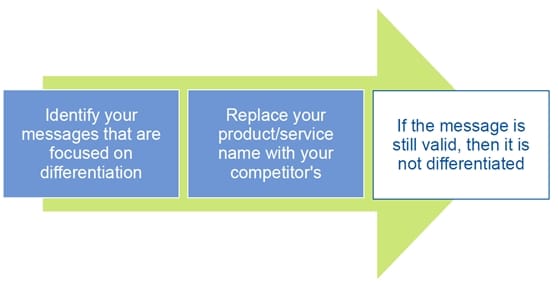
Source: Gartner
Marketing Outbound vs Inbound
Because the Customer has changed, and he/she is much more informed than 10 years ago, and because no-one has the time and will to be interrupted with cold calls from desperate salespeople trying to sell something, we also need to approach marketing in a different way. It needs to change from Outbound, where we call out to whoever is at the end of the communication channel when we want, with activities like telesales, newsletters, user events, etc. To Inbound – try to attract Customers (when they want, on their own time and rules) by posting relevant content about their needs we can fulfill, with actions like blog posts, videos, slides, social media, conferences presentations, etc.
While both Value Creation and Marketing are mostly a marketing job, the Consultant can be of great help, because he/she knows best what the company is actually doing during the IT projects. So the tasks needed from the Consultant would be: write articles, produce short videos, make conference presentations – all about things he/she encounters during the real projects.
Sales
Many of us expect already that the Consultant would help during the sales phase, with activities like demos, technical presentations, proof of concepts, etc. What I value a lot in a Consultant is also the ability to sell: convince the customer our solution or approach responds better to the Customer’s problems.
Now, a huge problem a Consultant with a technical background trying to sell has sometimes (and I have done it a lot of times as well) is going to the Customer and talking about the product’s or service’s attributes. Things like: „the bandwidth is this or that, the delay is 40 milliseconds” – you get the picture. The Customer couldn’t care less about product features: yes, people in the Customer’s organization actually care about the delay between their premises and your datacenter, but that is at a lower level than the initial discussion, or in other words too much of a detail for the managers running the business you are trying to help. What they value are things like:
- Time, reliability (peace of mind), ease, flexibility
- Quality, status, aesthetics, emotional impact
A much better approach to the Customer would be to talk about Values, as opposed talking about product Attributes. Here is an example when talking about Cloud projects:

Another very interesting aspect relevant to sales, is the Consultant’s profile. Thanks to my friends from Consalta (a Cloud marketing and sales organization) I found out that there are 5 behavioural patterns of a person, and only one of them has clear advantage. They are:
- Hard worker
- Challenger
- Relationship builder
- Lone wolf
- Reactive problem solver
If you think the relationship builder has the biggest chance to bring more sales, you are like me, and you are wrong. I also thought this in the beginning and found out the hard way that the relationship builder is great as an Account Manager (whose primary task is to keep the Customer happy), but not as a Consultant helping sales. The best would be the challenger:
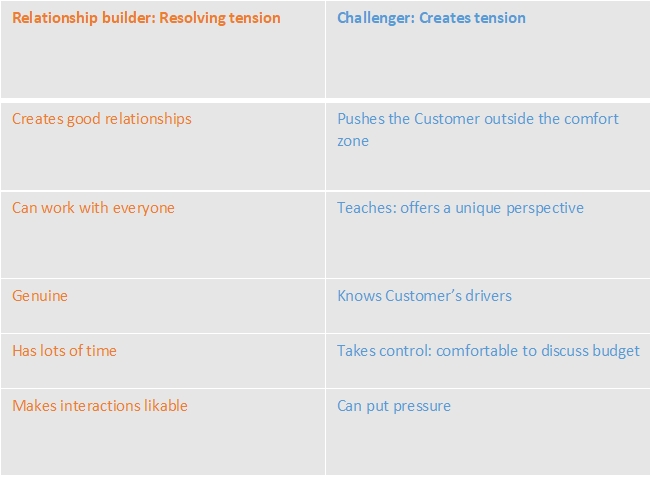
Delivery
Finally, the Consultant has to work, to do the actual project. This is nothing new to you, so I won’t explore this phase. We should always keep in mind, though, that we are not building a project (whatever that might be), but instead we are delivering a service to our customer. A very good description of what I am saying here can be found in Peter Leeson’s presentation at ITCamp 2017 called „Assembly of Japanese Bicycle Require Great Peace of Mind”
Recurrence
The project is done, long live the project!
Because of the technology advancements, partially described in the introduction, there is more and more need for companies to buy the IT projects we deliver in a recurrent model as opposed to a transactional model, which dominated the world since the apparition of server Operating Systems, ERP, enterprise scale Database Servers, etc.
Why? Because more of the whole IT is being purchased in a recurrent, subscription model. It is by far more attractive for the Customer to pay as they use (operational expenditure) than purchase in advance inside a multi-year contract (capital expenditure) which also means blocking the price at a certain level without benefiting from the price reduction the big IT vendors make every few months nowadays. There are business models through which a large enterprise can purchase Cloud with a monthly invoice, paying as they use, getting the new prices as the vendor reduces them, and not having to be locked into a contract for years.
Probably one of the most important ways to make sure a services company stays relevant in a recurrent model is to become a true Advisor. I define an Advisor through these attributes:
- Acts as a trusted partner. Which means telling the Customer that „this” is not the best solution even if that means losing short term sales.
- Play in their interest. For example, explain to them how they can reduce the total spending with IT: new services in the Cloud, new prices, etc.
- Training. Enable the Customer to make the best out of the IT they purchased by periodical workshops/webinars/etc.
This model is pretty new, but it is catching, especially because even the Customer knows that the best IT resources for very specific needs are not in their organization, but outside in the companies which are specialized on those niches.
Conclusion
Our opinion here in Avaelgo is that the Consultant’s job, whom we might now call Advisor, is much more complex than it used to be. I cannot end this better but with the journey from nothing really to recurring business:

About the author




